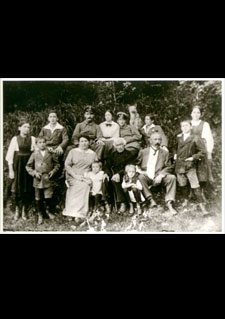Childhood and Youth
Karl Steinbauer was born on September 2, 1906 in Windsbach, the tenth of twelve children in a pastor’s family. His father, Pastor Johann Steinbauer, was the principal of the junior high school in Windsbach. Young Karl Steinbauer was greatly influenced by his Bible-reading grandfather, who remained a spiritual role model for him his entire life.
Steinbauer attended the junior high school in Windsbach. Since he initially wanted to become a farmer like his grandfather, he refused to do the required schoolwork for around one year and played juvenile pranks. The fourteen-year-old Steinbauer underwent a change after a serious talk with his father: He met the academic requirements, decided to become a pastor and began studying the Bible intensively. In the process, he came to the realization that human nature is to work and the Bible is the sole source of strength.
His family shared the general enthusiasm for World War I and was proud of its sons who were serving. They joined the Freicorps Epp soon after Germany’s defeat. Like many Germans, Steinbauer also blamed the Jews for the lost war and he viewed anti-Semitism as a patriotic duty. The then-fifteen-year-old youth felt schadenfreude when the synagogue in Windsbach was defaced with swastikas in 1922. Karl Steinbauer even sympathized with Hitler during the Weimar Republic and especially in the wake of inflation and the Beer Hall Putsch of 1923.
For a while, his father Johann’s and his brothers’ Nazi sympathies and anti-Semitism were influenced by Siegfried Leffler (1900–1983), a young member of the staff of the student dormitory at the junior high school in Windsbach. Leffler later became a co-founder of the radical Thuringian German Christians. Johann Steinbauer was transferred to Nuremberg in 1924 after the Beer Hall Putsch because of his political views. Karl Steinbauer was increasingly alienated by the euphoric enthusiasm for Hitler, which he witnessed there firsthand. Even his father Johann and his eldest brother Georg then began distancing themselves from the National Socialists for theological reasons.
Source / title
- © Private collection of Elisabeth Giesen, née Steinbauer, Cologne

